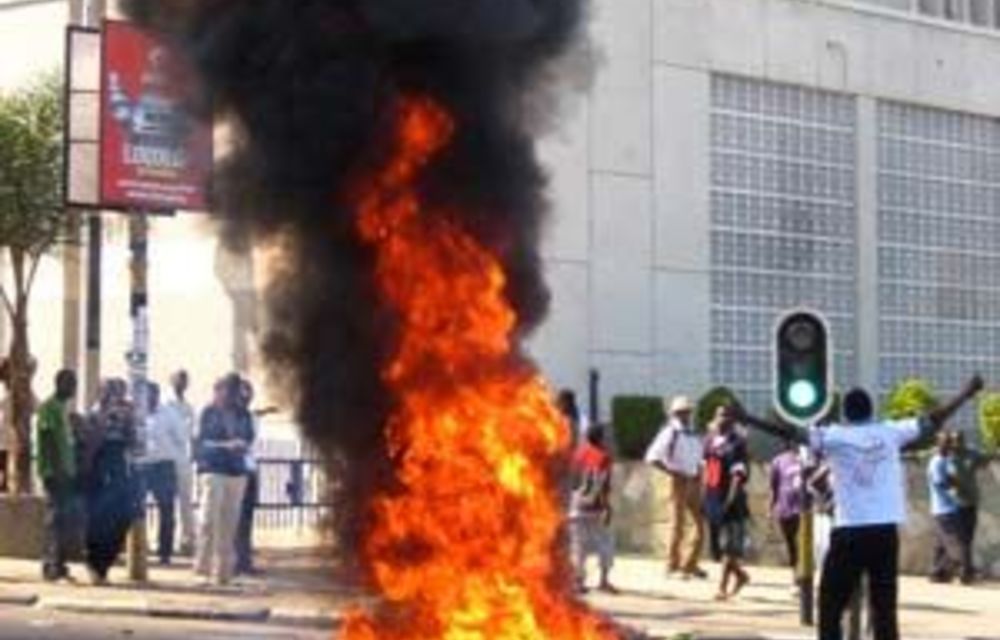
Shops are shuttered and troops on the street in Malawi, after protests against President Bingu wa Mutharika left 18 people dead and hundreds in prison, drawing reproach from the international community.
On Friday police said more than 275 people had been arrested across Malawi during two days of rioting.
About 200 were arrested for looting in the capital Lilongwe, the epicentre of the riots, said police spokesperson Davie Chingwalu.
Chingwalu said those arrested were “pure thugs” who face charges including malicious damage to property, arson and conduct likely to cause breach of peace.
Another 45 were arrested in the former colonial capital Zomba, and 30 in the commercial hub Blantyre.
The killings have raised global condemnation, with rights groups calling for a full investigation into the deaths.
United Nations secretary general Ban Ki-moon has expressed concern about the loss of life, and the United States and Britain condemned the violence by Malawi authorities and their crackdown on private radio stations trying to report on the violence.
“In light of continued rioting and rumors of retaliation, we urge restraint from both sides,” the US embassy in Pretoria said in a statement.
On Friday, European Union foreign policy chief Catherine Asthon also condemned Malawi’s use of force and urged the president to make good on his promise of dialogue with the opposition.
“I strongly condemn the use of force and live ammunition by Malawian authorities on 20 and 21 July and to prevent their own citizens from exercising their constitutional right to demonstrate peacefully,” Ashton said.
She also criticised a ban on media reporting the confrontations.
“Denying the right of people to protest peacefully is unacceptable, and I am disturbed by reports of unwarranted violence targeted at certain individuals on July 20 because of their political or social affiliations,” she said.
“At the same time I am also critical of and condemn the violence and looting perpetrated by a limited number of individuals during the protests.”
She called on the people and government of Malawi to “remain committed to the principles of democracy and to express and resolve disagreements through peaceful means.”
On Thursday, Mutharika refused to step down, saying in a national radio addressed that he would remain in power but was ready to meet the opposition and civil society.
New phenomenon
Such unrest is almost unheard of in Malawi, ruled for decades after independence in 1964, and until 1994, by the iron-fisted Hastings Banda, and echoes popular uprisings that have engulfed north Africa and the Middle East over the last seven months.
Health ministry spokesperson Henry Chimbali confirmed 10 deaths in the northern cities of Karonga and Mzuzu, where protesters angry at chronic fuel shortages and Mutharika’s rule ransacked his Democratic Progressive Party (DPP) offices on Wednesday.
Eight others died in the capital, Lilongwe, and Blantyre after police and troops fired tear gas to disperse crowds demanding Mutharika quit as leader of the nation of 13 million.
The deadly crackdown in the normally peaceful former British colony is likely to intensify public anger against Mutharika, a former World Bank economist first elected in 2004, and could destroy his already troubled relationship with the donors who keep his government afloat.
Diplomatic spat
Mutharika has presided over six years of high-paced but aid-funded growth, and the sheen came off earlier this year when he became embroiled in a diplomatic row with Britain, Malawi’s biggest donor, over a leaked embassy cable that referred to him as “autocratic and intolerant of criticism”.
The cable led to the expulsion of Britain’s ambassador to Lilongwe, and in response, Britain expelled Malawi’s representative in London and suspended aid worth $550-million over the next four years.
The freeze has left a yawning hole in the budget of a country that has relied on handouts for 40% of its revenues, and intensified a foreign currency shortage that is threatening the kwacha’s peg at 150 to the dollar.
The police and military presence in the southern commercial centre Blantyre has been reduced, vehicles were returning to roads and though many citizens were readying to attend funerals for those killed in the clashes, police blocked plans to hold any mass funerals.
“We have been stopped by the government with our arrangements to bury our heroes,” said Moses Mkandawire, director of the Church and Society rights group.
“The government says it will provide transport to have them buried in their respective (village) homes,” said Mkandawire.
No further explanation was given, he added.
Other funerals were planned Friday for victims in the capital Lilongwe and the commercial hub Blantyre, where soldiers patrolled the streets to prevent fresh unrest.
“The situation looks calm this morning, but let’s see what happens in the afternoon,” said Lilongwe resident and freelance journalist George Mtonya.
A heavy police and military presence remains on the streets of major cities, and church leaders and activists in the northern town of Mzuzu were preparing to bury of some of the people who died in the protests later Friday. — Sapa-AP, AFP, Reuters